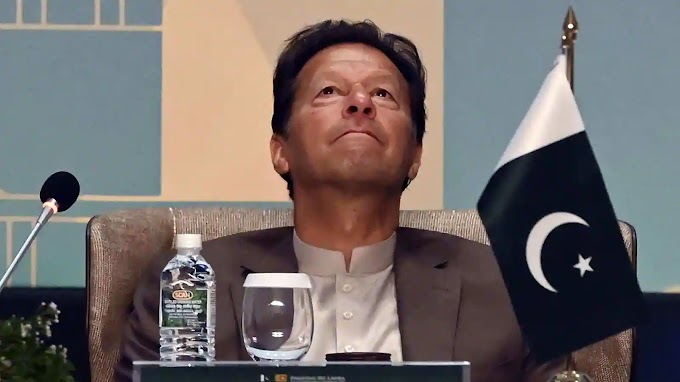 |
| Image from livemint.com |
Malaysian officials confiscated a Pakistan International Airlines Boeing 777 jet at Kuala Lumpur airport last month, with people still on board, for not paying $15 million in lease costs. In Pakistani media circles, the humiliating episode sparked jokes, mockery, and sorrow. As awkward as the situation was, unpaid lease costs are only the tip of the iceberg, and Pakistan's debt crisis has been building for years. However, the debt has grown at a double-digit rate in the last two years, rising from Pkr. 32.1 trillion in November 2019 to Pkr. 35.8 trillion in November 2020, excluding IMF loans and obligations owed to creditors indirectly through the government.
At the end of 2019-20, Pakistan's national debt surpassed 87 percent of GDP, up from over 72 percent at the end of 2017-18. In the fiscal year 2020, the country's total external debt and liabilities increased to $113.8 billion, up from $106.3 billion in the fiscal year 2019. Dr. Hafeez Sheikh, the finance minister, revealed to parliament earlier this month that Pakistan's total debt is Rs 36.5 trillion, with Rs 11.5 trillion borrowed in the last two years – Rs 600 billion for debt servicing, Rs 3 trillion for the rupee-dollar parity correction, and 1.5 trillion rupees for subsidies to cover the tax shortfall due to COV. Debt servicing has become the government's most pressing issue since it must continue to borrow to repay prior obligations.
Imran Khan's administration paid $11.895 billion in foreign public debt payments in 2019-20, according to data provided by the State Bank of Pakistan, and $3.593 billion in the first quarter of this fiscal year.
“We've put ourselves in a debt trap that we've created totally on our own. It puts our national security at risk.”
These sobering figures show that Pakistan is forced to borrow more money from local and international sources to meet its obligations, including loan repayments since it has failed to implement appropriate tax collection measures. Lower tax collections and high government spending are mostly to blame for the continuing budget deficit. Indirect taxes dominate revenue, accounting for 12.9 percent of GDP, while direct taxes only contribute for 2.2 percent. Excessive expenditure on non-developmental projects hasn't helped the country's internal debt position either, with a tax revenue shortfall of 10% of national GDP.
The fixed expenses paid to the independent power producers (IPPs) that contribute considerably to electricity generation in Pakistan are a key source of ‘circular debt,' or the power sector's outstanding debt. However, capacity payments to big power projects that have been in the works since 2015, particularly as part of the multibillion-dollar China Pakistan Economic Corridor (CPEC) program, are the primary culprit. Mismanagement of the economy and the funding of infeasible infrastructure through long-term debt instruments, as well as a heavy reliance on external borrowing rather than indigenous institutions, exacerbated the country's problems. The CPEC's implementation raised the debt load by opening the door to ever-increasing debt.
Nikkei Asia has reported that the two nations are at odds over the Main Line 1 (ML-1) railway project and special economic zones. According to reports, China was delaying finance for the $6.8 million Main Line 1 railway project, which Pakistan had requested at a low interest rate of less than 3%. China is hesitant to lend money since these projects are subject to local politics, which might cause returns on investment to be delayed.
Gwadar, the most expensive project under the CPEC umbrella, is also said to be having problems, with Beijing refusing to fund it at the one percent rate required by Islamabad. The exact mechanisms for China to begin producing and exporting commodities from Pakistan, which was supposed to commence in the second phase of the CPEC (2020-2025), are still being worked out. Due to funding disagreements, China has had to postpone its CPEC discussions with Pakistan.
Saudi Arabia requested repayment of a $3 billion loan and a $3.2 billion oil credit facility it granted in late 2018, putting Pakistan under even more strain. It has become the perfect target for China's loan shark methods since it is entangled in a convoluted web of borrowing from one country to pay off another. China Development Bank and Export-Import Bank of China (Eximbank) total loan has fallen from $75 billion in 2016 to $3 billion in 2020. Pakistan has fallen into the dreaded "debt trap," compelling it to compromise on its strategic thinking as a result of the vicious cycle of receiving new loans from China and repaying existing ones.
Imran Khan said in a recent interview with Foreign Policy's Jonathan Tepperman, "Look—China has assisted us." When our government was at its lowest point, China came to our aid. As a result, we are really thankful to the Chinese government, and we have opted to deal with any concerns we may have with China in private. We're not going public.”
The government's reliance on pricey foreign commercial debt is growing while cheaper and softer bilateral and multilateral transfers become limited. The IMF recently agreed to restart a $6 billion Extended Fund Facility (EFF) loan program only if it is linked to tax reforms, an electricity and gas price adjustment mechanism with price adjustments, raising the repo rate – which was lowered to 7% in June from 13.25 percent earlier, a targeted subsidy strategy, and the restructuring of public-sector pensions.
Because Pakistan had not met key benchmarks, the IMF would provide just one tranche of $500 million by March-end 2021, subject to the approval of the IMF's Executive Board. The IMF granted a $1.4 billion Rapid Financing Instrument (RFI) above and above the EFF agreement to assist Pakistan in dealing with the COVID-19 epidemic.






Help us to Improve our service